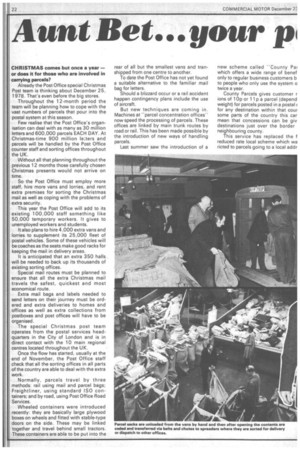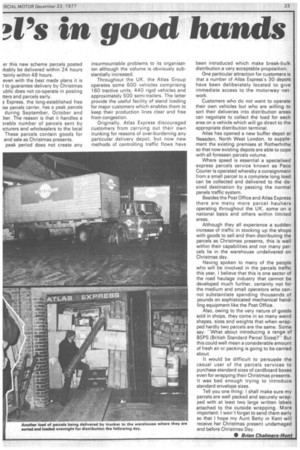Aunt Bet...your p
Page 24

Page 25

If you've noticed an error in this article please click here to report it so we can fix it.
49s in good hands
CHRISTMAS comes but once a year — or does it for those who are involved in carrying parcels?
Already the Post Office special Christmas Post team is thinking about December 25, 1978. That's even before the big stores.
Throughout the 12-month period the team will be planning how to cope with the vast numbers of parcels that pour into the postal system at this season.
Few realise that the Post Office's organisation can deal with as many as 30 million letters and 600,000 parcels EACH DAY. At Christmas-time 900 million lezters and parcels will be handled by the Post Office counter staff and sorting offices throughout the UK.
Without all that planning throughout the previous 12 months those carefully chosen Christmas presents would not arrive on time.
So the Post Office must employ more staff, hire more vans and lorries, and rent extra premises for sorting the Christmas mail as well as coping with the problems of extra security.
This year the Post Office will add to its existing 100,000 staff something like 50,000 temporary workers. It gives to unemployed workers and students.
It also plans to hire 4,000 extra vans and lorries to supplement its 25,000 fleet of postal vehicles. Some of these vehicles will be coaches as the seats make good racks for keeping the mail in delivery areas.
It is anticipated that an extra 350 halls will be needed to back up its thousands of existing sorting offices.
Special mail routes must be planned to ensure that all the extra Christmas mail travels the safest, quickest and most economical route.
Extra mail bags and labels needed to send letters on their journey must be ordered and extra deliveries to homes and offices as well as extra collections from postboxes and post offices will have to be organised.
The special Christmas post team operates from the postal services headquarters in the City of London and is in direct contact with the 10 main regional centres located throughout the UK.
Once the flow has started, usually at the end of November, the Post Office staff check that all the sorting offices in all parts of the country are able to deal with the extra work.
Normally, parcels travel by three methods: rail using mail and parcel bags; Freightliner, using standard ISO containers; and by road, using Post Office Road Services.
Wheeled containers were introduced recently: they are basically large plywood boxes on wheels and fitted with stable-type doors on the side. These may be linked 'together and travel behind small tractors. These containers are able to be put into the rear of all but the smallest vans and transhipped from one centre to another.
To date the Post Office has not yet found a suitable alternative to the familiar mail bag for letters.
Should a blizzard occur or a rail accident happen contingency plans include the use of aircraft.
But new techniques are coming in. Machines at "parcel concentration offices" now speed the processing of parcels. These offices are linked by main trunk routes by road or rail. This has been made possible by the introduction of new ways of handling parcels.
Last summer saw the introduction of a new scheme called "County Pal which offers a wide range of benef only to regular business customers b to people who only use the system o twice a year.
County Parcels gives customer r ions of lOp or 11p a parcel (depend weight) for parcels posted in a postal ( for any destination within that cour some parts of the country this car mean that concessions can be giv destinations just over the border neighbouring county.
This service has replaced the f reduced rate local scheme which wa ricted to parcels going to a local addr
or this new scheme parcels posted ibably be delivered within 24 hours .tainly within 48 hours.
even with the best made plans it is t to guarantee delivery by Christmas ublic does not co-operate in posting tiers and parcels early.
s Express, the long-established free ise parcels carrier, has a peak parcels during September, October and ber. The reason is that it handles a arable number of parcels sent by icturers and wholesalers to the local These parcels contain goods for and sale as Christmas presents.
peak period does not create any insurmountable problems to its organisation although the volume is obviously substantially increased.
Throughout the UK, the Atlas Group operates some 600 vehicles comprising 160 tractive units, 440 rigid vehicles and approximately 500 semi-trailers. The latter provide the useful facdity of stand loading for major customers which enables them to keep their production lines clear and free from congestion.
Originally, Atlas Express discouraged customers from carrying out their own trunking for reasons of over-burdening any particular delivery depot, but now new methods of controlling traffic flows have been introduced which make break-bulk distribution a very acceptable proposition.
One particular attraction for customers is that a number of Atlas Express's 30 depots have been deliberately located to give immediate access to the motorway network.
Customers who do not want to operate their own vehicles but who are willing to sort their deliveries into distribution areas can negotiate to collect the load for each area on a vehicle which will go direct to the appropriate distribution terminal.
Atlas has opened a new buffer depot at Neasden, North West London, to supplement the existing premises at Rotherhithe so that now existing depots are able to cope with all foreseen parcels volume.
Where speed is essential a specialised express parcels service known as Pace Courier is operated whereby a consignment from a small parcel to a complete long load can be collected and delivered to the desired destination by passing the normal panels traffic system.
Besides the Post Office and Atlas Express there are many more parcel hauliers operating throughout the UK, some on a national basis and others within limited areas.
Although they all experience a sudden increase of traffic in stocking up the shops with goods to sell and then distributing the parcels as Christmas presents, this is well within their capabilities and not many parcels lie in the warehouse undelivered on Christmas day.
Having spoken to many of the people who will be involved in the parcels traffic this year, I believe that this is one sector of the road haulage industry that cannot be developed much further, certainly not for the medium and small operators who cannot substantiate spending thousands of pounds on sophisticated mechanical handmg equipment like the Post Office.
Also, owing to the very nature of goods sold in shops, they come in so many weird shapes, sizes and weights that when wrapped hardly two parcels are the same. Some say: -What about introducing a range of BSPS (British Standard Parcel Sizes)?" But this could well mean a considerable amount of fresh air or packing is going to be carried about.
It would be difficult to persuade the casual user of the parcels services to purchase standard sizes of cardboard boxes even for wrapping their Christmas presents. It was bad enough trying to introduce standard envelope sizes.
Tell you one thing: I shall make sure my parcels are well packed and securely wrapped with at least two large written labels attached to the outside wrapping. More important: I won't forget to send them early so that I hope my Aunt Betty in Kent will receive her Christmas present undamaged and before Christmas Day.
• • Brian Chalmers-Hunt




































































